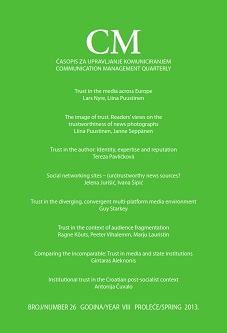Trust in the Author: Identity, Expertise and Reputation
Trust in the Author: Identity, Expertise and Reputation
Author(s): Tereza PavlíčkováSubject(s): Media studies, Social Informatics
Published by: Fakultet političkih nauka Univerziteta u Beogradu
Keywords: audiences; author; media use; new media; trust;
Summary/Abstract: The diverse character of sources available online requires media users to employ strategies of interpretation to establish whether the particular source is trustworthy or not. Yet this might be rather problematic in the case of user-generated content, where readers may have no previous experience of authors who are unknown to the reader, and moreover, the author might be hidden behind an online identity. Building on Luhmann’s theoretical concept of familiarity as a necessary pre-condition of trust, the study draws on qualitative interviews with young professionals on their crossmedia consumption; the analysis reveals that the respondents, as media users, establish an imagined author as part of the process of interpretation. The concept of the imagined author is developed theoretically using Genette’s concept of paratext. It is thus the reader’s realisation of the author that belongs to the text as a paratextual feature, and is clearly formed of three qualities perceived by the audience: the author’s identity, expertise and reputation. The ability to establish these qualities in the author helps the users to place the imagined author within a broader context of previous experiences, establish familiarity with the text and therefore decide whether they will place trust in the text or not.
Journal: CM Komunikacija i mediji
- Issue Year: 8/2013
- Issue No: 26
- Page Range: 33-50
- Page Count: 18
- Language: English

